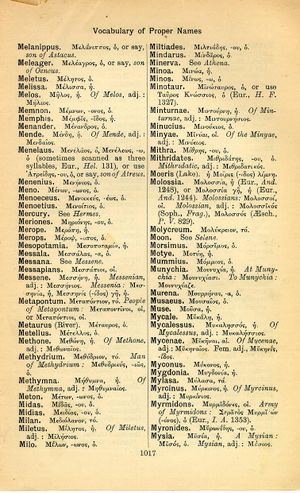Menenius
English > Greek (Woodhouse)
Μενήνιος, ὁ.
Latin > English (Lewis & Short)
Mĕnēnĭus:
I name of a Roman gens. Its most celebrated member was Menenius Agrippa, who told the people the fable of the belly and the limbs, Liv. 2, 16, 7; 2, 32, 8; 2, 33, 10.—Another Menenius in the time of Horace, noted as a foolish person, Hor. S. 2, 3, 287.—
II Hence,
A Mĕnēnĭus, a, um, adj., Menenian: tribus, a Roman tribe, Cic. Fam. 13, 9, 2.—
B Mĕnēnĭānus, a, um, adj., of or belonging to Menenius, Menenian: judicium, i. e. of Menenius Agrippa, Liv. 2, 52, 8.
Latin > French (Gaffiot 2016)
Mĕnēnĭus,¹¹ ĭī, m.,
1 nom d’une famille rom. ; nott Ménénius Agrippa [qui apaisa le peuple révolté en lui faisant comprendre l’apologue « les membres et l’estomac »] : Liv. 2, 16, 7 ; 2, 32, 8 || autre du même nom : Hor. S. 2, 3, 287
2 -nĭus, a, um, de Ménénius : Cic. Fam. 13, 9, 2, ou -nĭānus, a, um, Liv. 2, 52, 8.

